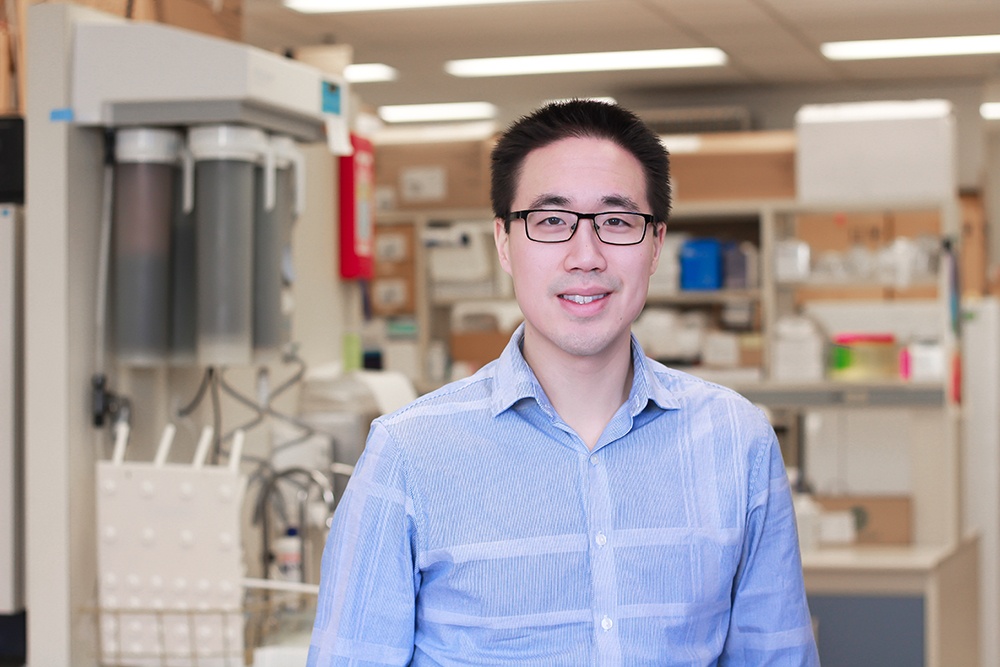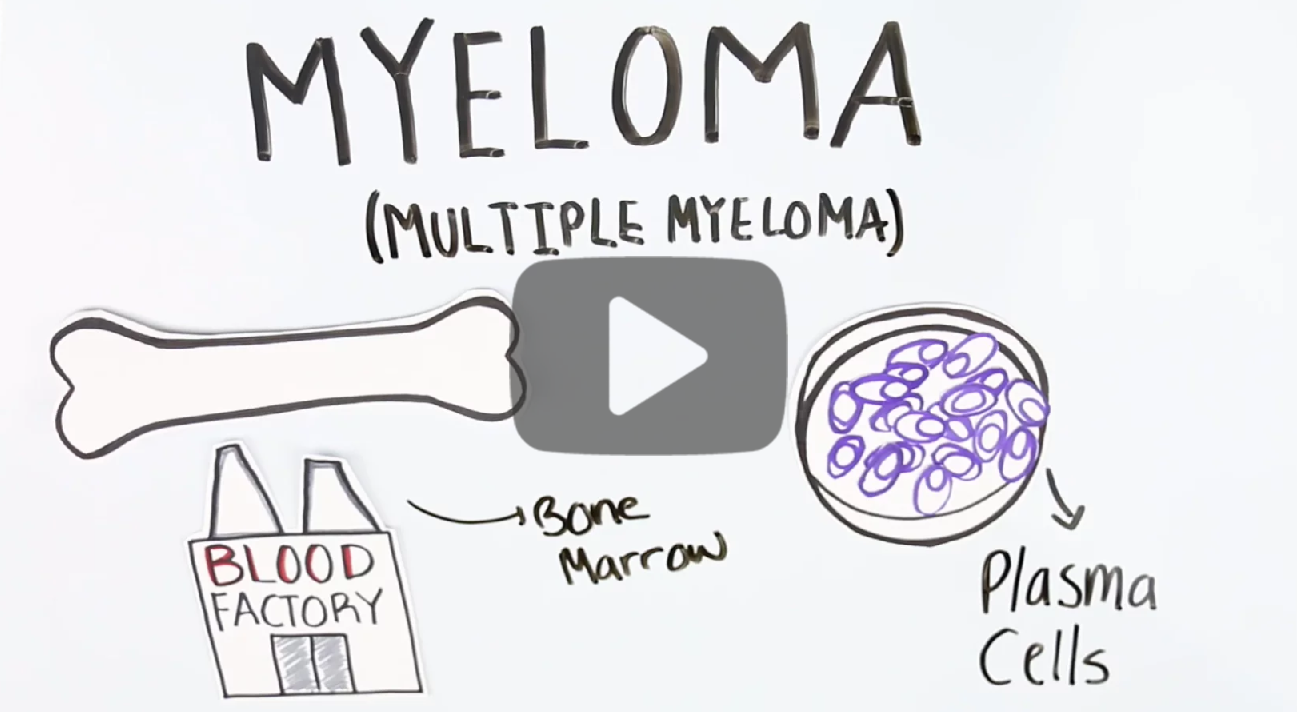
Clinician and researcher Michael Chu works on innovative ways to treat blood cancers with the help of generous donations. (Photo: Melissa Fabrizio)
Bill Sutherland's experience with lymphoma began with an unexpected abnormal blood test.
"Well, turns out that I got cancer. It was quite a journey before they found it," said Sutherland. "I was probably the healthiest guy in the world, playing hockey and doing things non-stop." Sutherland, a business owner from Edmonton, underwent all kinds of tests and treatments to discover what was happening to him before he received the diagnosis of Hodgkin lymphoma.
John Simkin has been battling multiple myeloma for almost nine years. His treatments and trials with new medications have become the reason for long trips from his ranch in Veteran, Alberta, to the Cross Cancer Institute in Edmonton and other facilities.
Lymphoma and myeloma are types of blood cancers, and myeloma has no known cure yet. Together, blood cancers are the fifth most common cancer to be diagnosed, affecting more than 500 people every year. Because of the diversity of diseases, symptoms that usually lead to diagnosis can range from fatigue, kidney function problems and abnormalities in blood tests to severe weight loss and enlarged lymph nodes.
Simkin and Sutherland don't know each other, but both were determined to make a difference and decided to donate to malignant hematology research (which includes myeloma and lymphoma) at the University of Alberta.
The generous donations given by Sutherland and Simkin could lead U of A research to change the face of cancer therapies by bringing patients closer to better treatments, and hopefully a cure for myeloma.
Fighting cancer from the inside
Research on myeloma care has managed to expand patients' life expectancy from three-to-five years, to a current average of above eight years. Current treatments have a limit of effectiveness on a patient, and once they 'maxed out' on one particular treatment it is difficult for them to go back and start a new therapy.
"It is a blood cancer in a part of a system that normally creates antibodies and it's normally supposed to defend you, but for some reason mutates. It is a disease that continues to become problematic and life-threatening," said clinician and researcher Michael Chu, from the University of Alberta's Department of Oncology and member of the Cancer Research Institute of Northern Alberta (CRINA), currently practicing at the Cross Cancer Institute.
Although Hodgkin lymphoma is largely curable, in certain patients this disease is incurable and life-threatening at relapse. It is only recently that immune-based treatments have made major advances in the lives of these patients.
Looking into the body's own immune system to fight myeloma and other blood cancers more precisely is the mission taken on by Chu, as an alternative to what he calls "the nuclear weapon" that is traditional chemotherapy. This research will be moving forward much faster thanks to the boost received from Bill Sutherland and John Simkin's gifts of financial support.
"We are trying to limit the level of toxicity and side effects and maximize the anticancer effect," said Chu. "My research program has been able to identify a couple of new treatment options, homegrown here in Alberta."
An alumnus from the U of A's Faculty of Medicine & Dentistry, Chu spent some time at Stanford University on a research training clinical fellowship, and a new job opportunity brought him back to Edmonton to propel his interest in translational research.
"Rather than continuing to follow on what's been done before, I want to set a new path and set new standards about how we can do things in the future," said Chu. "Right now we don't have a permanent cure so there's definitely room for improvement."
The new funding will allow Chu to bring in experienced research assistants to his team and improve his research lab. He is also focusing more of his research on cellular therapies, which could eventually provide an innovative and accessible option for cell treatment in western Canada through the U of A's Alberta Cell Therapy Manufacturing facility.
"With the expansion of scope and now looking at cellular therapy, I can hopefully bring it to the clinic in the following years. We can keep looking at the deeper side of questions-why therapies fail in some patients, what the shortcomings are and how can we overcome them, make treatment better. This donation can help these projects further along."
Chu says he is thankful for the advances he will achieve through these gifts. "Having the support of a philanthropic donation adds that backbone of support so I'm not always looking over my shoulder and wondering if I will be able to afford to continue with my research tomorrow."
Giving a new hope for those to come
"I can't stand it when I don't have answers to things. I was never used to being sick and suddenly I was on chemo," said Sutherland, who has Chu as his oncologist and learned about his research to improve diagnosis and care.
"I did my own research too. He was always interested in what I had to say, and I decided it was important to support him. It will be a huge help for the health-care system, they won't have to go around in circles like they did with me and will shorten the pain people go through."
Simkin has also been recently under Chu's care, and found in his work a mindset he could relate with. He shared his own thoughts about myeloma treatment with him. "Dr. Chu came along and he was a complete breath of fresh air," he said.
"He's willing to listen to that kind of ideas. Even if he can't use them yet, he will listen and he understands very well. He has a broader perspective on what doctors can have in their 'toolbox' to fight the disease. I was so impressed by that, that I decided to give a donation to further his work."
Simkin and Sutherland decided to give so future patients can benefit down the road.
"It gives people with my affliction more hope. Research is what opens up the doors to new possibilities, somebody has to do the thinking and the work behind the scenes before anything can happen for the general population," added Simkin.
"Hopefully they will find a cure," said Sutherland. "The chemo is not great day after day."
Meet our partners in research
Michael Chu's research project is also possible thanks to the generous support from the Myeloma Alberta Support Society (MASS).
Learn more about myeloma research with this short video:

This video was created for Myeloma Canada by UAlberta design students Jordan Riemer and Kennedy Quigley. To find out more about their work, visit their website 780Film.